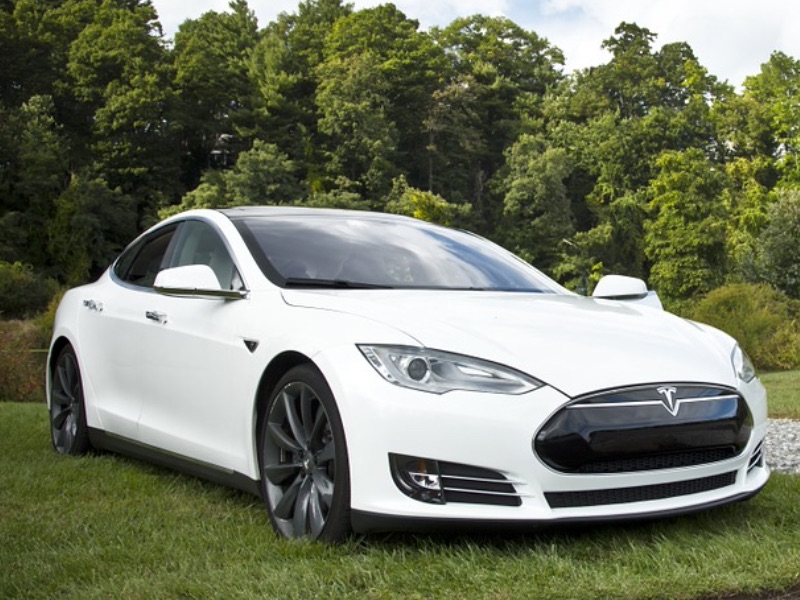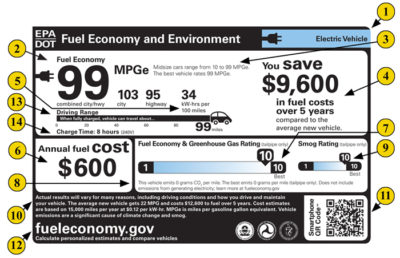MPGe or MPG-equivalent, created by the US EPA, is a way to compare the energy cost of driving an electric vehicle to a gas car. BUT IT IS NOT WHAT MOST PEOPLE THINK! It is good for comparing EVs to each other, but NOT for comparing an EV to an ICE car.

At this point in time, we have both EVs (Electric Vehicles) and ICEs (Internal Combustion Engines) on the roads. As someone considers buying a first EV, I think one primary question on their mind will be “How does the cost of driving this EV compare to the cost of driving my ICE?” And since we mostly think about the cost of driving using MPG (miles per gallon) it seems like we should have a comparable figure for EVs. Also, at first guess, it seems like MPG-e should do that. Unfortunately, it does NOT (see below).
MPG-ev
First, I’m going to define a new measure called MPG-ev for EVs and define it as follows to match the above description:
MPG-ev is the miles per gallon an ICE car would need to achieve to match the fuel COST of driving this EV the same distance.
This is actually easiest to understand by an example. So let’s use my Bolt EV. For each kWh of energy it uses, it can drive from 3.5 to 4.5 miles. We will use 4.0 miles/kWh.
Let’s say I drive 100 miles. That will take 25 kWh of electrical energy. Given that I’m charging at home, I can review my electric bill and see that I pay $0.10 per kWh (it is actually $0.11, but I want to make the math easy). So driving this 100 miles costs me 25 * $0.10 or $2.50.
Now let’s compare this to an ICE. Here in Cincinnati gas is going for about $2/gal. So, for that same $2.50, I could buy 1.25 gallons of gas.
Now for the 1.25 gallons of gas to take me 100 miles, an ICE car would need to get 80 MPG (miles per gallon). That is 100 miles divided by 1.25 gallons.
The formula is very straight forward:
MPG-ev = EV miles/kWh * GasCost / ElectricCost Mental check
You can now also do a mental check. If the cost of gas doubles, then you would expect that the EV would look even better. In fact, if the cost of gas doubles, then the MPG-ev rating would double. Similarly, if the cost of electric rate doubles, then you would expect the EV to look like a worse option because now you will need to pay twice as much for your fuel and the MPG-ev rating actually goes to one half.
Actual Numbers
To make this work, we just need to get the units of the values right. Below are some values from my car and location.
| EV efficiency | miles/KWH | 3.9 | My Chevy Bolt EV | |
| Cost of gasoline | $/gal | 2.10 | Midwest US, Nov, 2020 | |
| Cost of electric | $/KWH | 0.110 | Midwest US, Nov, 2020 |
So for me (today) this works out to:
3.9 mi/KWH * 2.10 $/gal
-------------------------------- = 74 MPG-ev
0.110 $/KWH
So said in English, my Bolt EV costs as much to run per mile as an ICE car which gets 74 miles per gallon given that gas costs $2.10/gal and the electric cost to charge the car is 11¢/KWH. [In real life, car charging could be free or much more expensive, but that is a topic for another post.]
Note that this formula, as expected, balances out the cost of gas and electricity. If the price of gas goes up, my MPG-ev would also go up and the electric car would appear to be even more efficient 🙂 . Similarly, if the cost of electricity goes up, the car would appear to be a less 🙁 efficient use of my money.
EPA Labeling – What MPGe means?
You can see the definitions of the EPA labeling here. In section 2 you will see that it says for MPGe rating:
[MPGe] represents the number of miles the vehicle can go using a quantity of fuel with the same energy content as a gallon of gasoline.
https://www.epa.gov/fueleconomy/text-version-electric-vehicle-label
A gallon of gas contains 33.7 kWh of energy. So this EPA labeling means, how far can this EV travel on 33.7 kWh of energy stored in its battery. I guess that this kinda works out as a comparison, but it is definitely not what most people would expect. If the dollar cost of gasoline energy is the same as the dollar cost of electrical energy, then this comparison would be what people think. But this hides the fact that gas and electric energy are very different.
As you start to understand this, you then start seeing that an EV is just a very different vehicle than the “dino-juice” ICE cars. The cost to drive any car will vary based on a number of items, including:
- How much you drive (of course).
- The cost of insurance (yep).
- The cost of repairs (EVs are much simpler, but have very expensive batteries)
- And the price of fuel !!
For fuel, the cost of driving an EV will vary with the electric cost and opposed to varying with respect to the cost of gasoline. And this is where you can start thinking about the environmental impact. If you have solar panels at your house or select a clean energy supplier, you are GREATLY reducing your environmental impact. What is that worth?
Links:
My Chevy Bolt EV comes in at a EPA MPGe of 128. You can see others here at USNews.com.
You can read about KWH/100mi ratings here at edmunds.com.
Wikipedia has a nice article on the cost of electric by source here.

1 thought on “MPGe Calculations”
Comments are closed.